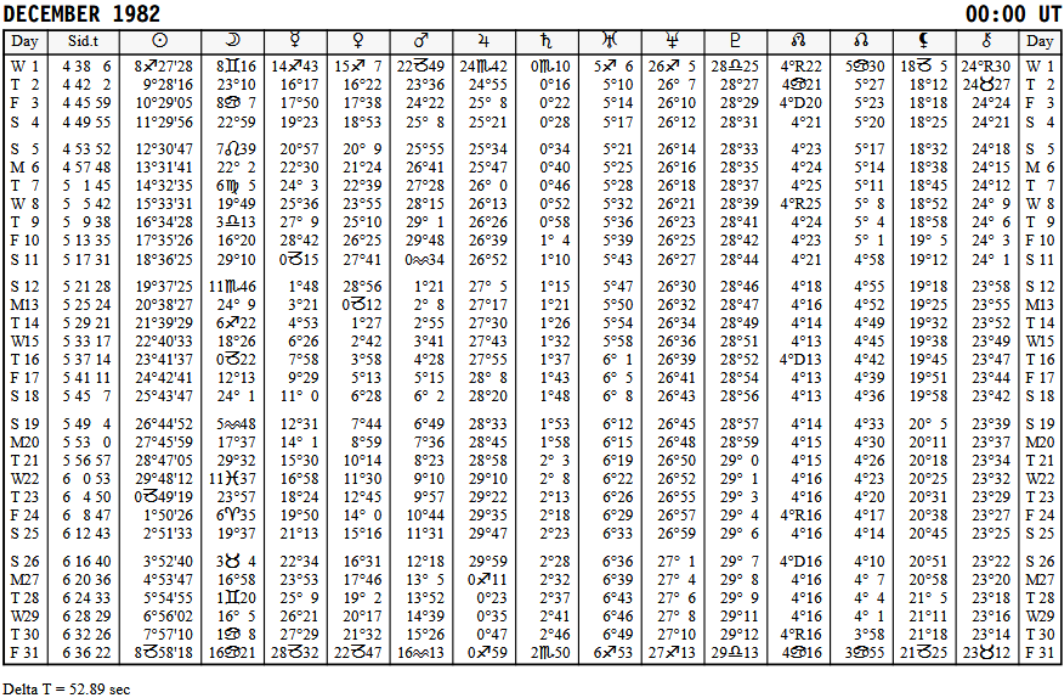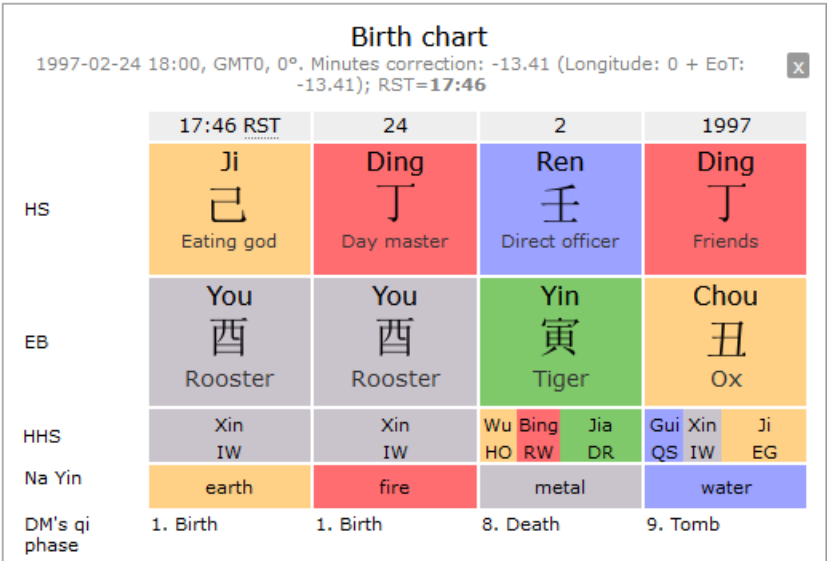
( From Swiss Ephemeris for Users: https://www.astro.com/swisseph/swepha_e.htm )
You can become truly aware and enjoy every bit of life only if you are constantly aware that you are mortal.
-- Sadguru --
中西文化不同,令算命學的模樣也相應不同。西方的占星學,非常着重人的心性,着重探視人的內在心靈渴求,及如何幫助人們如何發展他的優良品質,及藝術修養,我很欣賞西方人這種取向。
The differences between Chinese and Western cultures makes fortune-telling look different. Western astrology focuses very much on the human heart, on exploring people’s inner desires, and how to help people develop their good qualities and artistic accomplishments. I appreciate this orientation.
中國的算命學,則比較物質導向,比較功利主義,它着眼在外界環境對算命者的影響,多於反映自身的種種缺陷。因為中國人較缺乏懺悔文化,不會打算找出自己的缺點,昇華自己,我認為這是中國算命術需要改善的地方。
Chinese fortune-telling is more material-oriented and more utilitarian. It focuses on the influence of the external environment rather than the shortcomings of the individuals. Because the Chinese lack a culture of repentance, they do not intend to find out their shortcomings and improve themselves. I think this is where Chinese fortune-telling needs to be improved.
西方的占星術,現在學習的人多了,已掀開了她的神秘面紗。今天不少人已知道,我們熟知的「星座運程」說的是「太陽星座」,即是人出生的時候,太陽在甚麼位置。「星座運程」利用太陽相對於地球的位置,作為推算命運的依據。而一套專業的占星術,其實包括了九大行星的位置,即金星、木星、水星、火星、土星、天王星、海王星及冥王星,及太陽與月亮等。這些行星的位置,需要查閱星曆,如果沒有電腦幫助,要畫一個占星圖出來論命,很花功夫。
There are many people studying Western astrology, and its mystery has been lifted. Many people today know that the well-known "horoscope" refers to the "sun", that is the position of the sun when a person is born. The "horoscope" uses the position of the sun relative to the earth as a basis for calculating fate. And a set of professional astrology actually includes the positions of the nine planets, namely Venus, Jupiter, Mercury, Mars, Saturn, Uranus, Neptune and Pluto, as well as the sun and moon. For the location of these planets, you need to consult the ephemeris. If you don't have the help of a computer, it takes a lot of effort to draw an astrological chart to tell your fate.

( From Swiss Ephemeris for Users: https://www.astro.com/swisseph/swepha_e.htm )
中國主要的算命術 - "八字" 也一樣,但大家可能不知道,八字一開始並不是用於算命術中,它只是用來記錄時間,例如辛亥革命(1911)、庚子賠款(1900)、辛丑條約(1901)…等。這些辛亥、庚子、辛丑記錄了事件的年份,當中第一個字叫做「天干」,第二個字「地支」,兩個字組合起來叫做「干支」。在八字學裏,有時叫它做「柱」。由於這裏用兩個字記錄年份,所以叫做「年干支」或叫「年柱」,常用於紀錄歷史事件的年份。此外,這個干支除了用來記錄年份之外,尚可以紀錄月份、日子和時間。所以年、月、日、時便由四個天干和四個地支組合而成,由於一共用了八個字,於是便稱為「八字」。後來更有人使用一個人出生時間的八個字來推算他的命運,於是順理成章,便稱這個方法為「八字算命法」了。
The main Chinese fortune telling tool - "Bazi" is also the same, but you may not know that Bazi was not initially used for fortune-telling, but to record time, such as the 辛亥革命 Xinhai Revolution (1911), 庚子賠款 Gengzi Indemnity (1900), 辛丑條約 Xin Chou Treaty (1901)...etc. These Xinhai, Gengzi, and Xin Chou refers to the year of the incidents.
The first character is called "天干" or “Stem” and the second character is "地支” or “Branch". The combination of the two characters is called "干支". In the study of Bazi, it is sometimes referred to as a "pillar". Since two words are used here to record the year, it is called "年干支” or “年柱", which is often used to record historical events.
In addition, in addition to recording the year, the pillar can also be used to record the month, day, and time. Therefore, the year, month, day, and hour are composed of four stems and four branches. Since they come together to form eight characters, they are called "eight characters" or “bazi”. Later, some people would go on to use the eight characters of a person's birth time to calculate his fate, so it was logical to call this method the "bazi fortune telling method".

Bazi chart sample
以上是一個八字盤的例式,它顯示的時間為「丁丑年、壬寅月、丁酉日、己酉時」。你可到這個網站免費建立你的出生八字盤:https://bazi-calculator.com/。
The above is an example of a set of bazi. It shows the time as "Ding Chou Year, Ren Yin Month, Ding You Day, Ji You Hour". There are several websites, including this ( https://bazi-calculator.com/ ) where you can quickly arrive at your set of Bazi for free.
接下來的文章,我將會一步步告訴大家,如何解讀這八個字,揭示你一生的潛在趨勢。
In the next article, I will tell you step by step how to interpret these eight characters and reveal the potential trends of your life.
Yan Chan 陳一言
chanyiyan@gmail.com